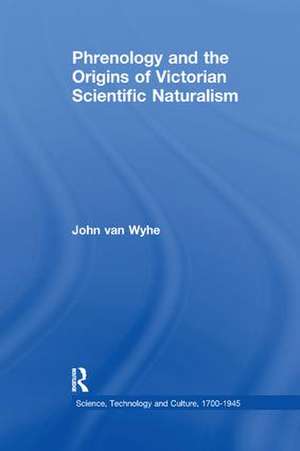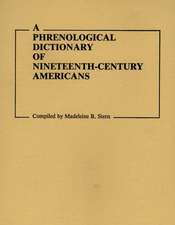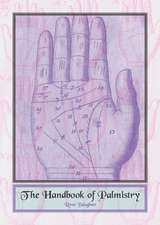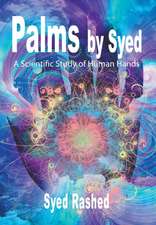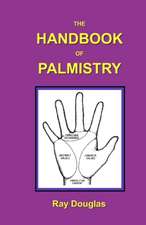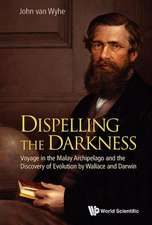Phrenology and the Origins of Victorian Scientific Naturalism: Science, Technology and Culture, 1700-1945
Autor John van Wyheen Limba Engleză Paperback – 6 mar 2017
| Toate formatele și edițiile | Preț | Express |
|---|---|---|
| Paperback (1) | 469.34 lei 6-8 săpt. | |
| Taylor & Francis – 6 mar 2017 | 469.34 lei 6-8 săpt. | |
| Hardback (1) | 1113.12 lei 6-8 săpt. | |
| Taylor & Francis – 28 mar 2004 | 1113.12 lei 6-8 săpt. |
Din seria Science, Technology and Culture, 1700-1945
-
 Preț: 310.88 lei
Preț: 310.88 lei -
 Preț: 475.16 lei
Preț: 475.16 lei - 18%
 Preț: 299.52 lei
Preț: 299.52 lei -
 Preț: 469.34 lei
Preț: 469.34 lei -
 Preț: 469.34 lei
Preț: 469.34 lei -
 Preț: 489.26 lei
Preț: 489.26 lei -
 Preț: 464.12 lei
Preț: 464.12 lei -
 Preț: 489.26 lei
Preț: 489.26 lei - 30%
 Preț: 820.73 lei
Preț: 820.73 lei -
 Preț: 469.34 lei
Preț: 469.34 lei -
 Preț: 469.34 lei
Preț: 469.34 lei -
 Preț: 486.49 lei
Preț: 486.49 lei -
 Preț: 416.22 lei
Preț: 416.22 lei -
 Preț: 469.34 lei
Preț: 469.34 lei -
 Preț: 469.34 lei
Preț: 469.34 lei - 22%
 Preț: 259.98 lei
Preț: 259.98 lei - 22%
 Preț: 259.98 lei
Preț: 259.98 lei - 12%
 Preț: 299.52 lei
Preț: 299.52 lei - 30%
 Preț: 821.13 lei
Preț: 821.13 lei -
 Preț: 489.26 lei
Preț: 489.26 lei - 26%
 Preț: 248.30 lei
Preț: 248.30 lei - 26%
 Preț: 876.78 lei
Preț: 876.78 lei -
 Preț: 383.93 lei
Preț: 383.93 lei - 16%
 Preț: 261.54 lei
Preț: 261.54 lei - 18%
 Preț: 1001.77 lei
Preț: 1001.77 lei
Preț: 469.34 lei
Nou
Puncte Express: 704
Preț estimativ în valută:
89.82€ • 97.53$ • 75.45£
89.82€ • 97.53$ • 75.45£
Carte tipărită la comandă
Livrare economică 22 aprilie-06 mai
Preluare comenzi: 021 569.72.76
Specificații
ISBN-13: 9781138249080
ISBN-10: 1138249084
Pagini: 300
Dimensiuni: 156 x 234 x 16 mm
Greutate: 0.45 kg
Ediția:1
Editura: Taylor & Francis
Colecția Routledge
Seria Science, Technology and Culture, 1700-1945
Locul publicării:Oxford, United Kingdom
ISBN-10: 1138249084
Pagini: 300
Dimensiuni: 156 x 234 x 16 mm
Greutate: 0.45 kg
Ediția:1
Editura: Taylor & Francis
Colecția Routledge
Seria Science, Technology and Culture, 1700-1945
Locul publicării:Oxford, United Kingdom
Cuprins
Contents: Introduction; The evolution of phrenology in Britain; The nature of controversies; Authority over man's constitution; The receptions of The Constitution of Man; Epidemics of phrenological naturalism; Conclusions; Appendices; Bibliography; Index.
Notă biografică
Dr John van Wyhe is Affiliate Researcher in the Department of History and Philosophy of Science at Cambridge University, Cambridge, UK.
Recenzii
'... a readable, thoroughly referenced, and bibliographically up-to-date introduction to phrenology's historical and historiographical contexts of debate.' Notes and Records of the Royal Society '... provides an engaging and well-referenced account of phrenology's role in the development of British scientific naturalism during the 1800s.' Journal of the History of the Behavioral Sciences 'The careful and thoughtful research recorded here makes the book a basic resource for historians interested in both phrenology and the struggle for authority in British culture among scientists, evangelicals and many other would-be cultural leaders.' British Journal for the History of Science
Descriere
Through a reassessment of the science of phrenology, particularly the work of George Combe, Phrenology and the Origins of Victorian Scientific Naturalism challenges the orthodoxy that Charles Darwin's 1859 work The Origin of Species was the most influential work of Victorian science. Instead it is argued that Combe's phrenological work, The Constitution of Man in Relation to External Objects, published thirty one years previously, not only outsold Darwin's book, but also prepared the ground into which his evolutionary theories were dropped. Phrenology and the Origins of Victorian Scientific Naturalism also sheds light on all kinds of works in Victorian Britain and America which have previously been unnoticed or were simply referred to with a vague 'naturalism of the times' explanation. By restoring Combe and his work to centre stage it provides modern scholars with a more accurate picture of the Victorians' view of their place in Nature.
